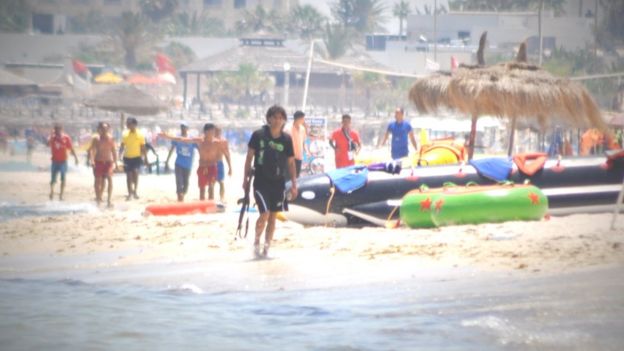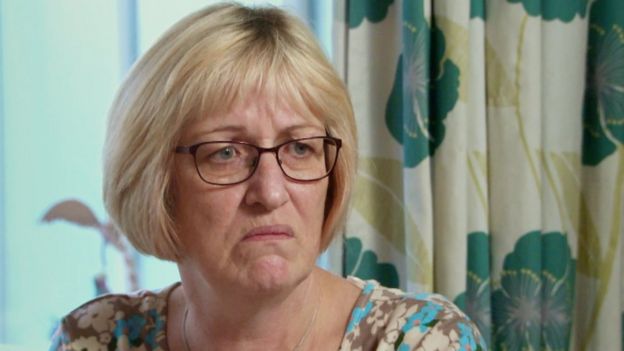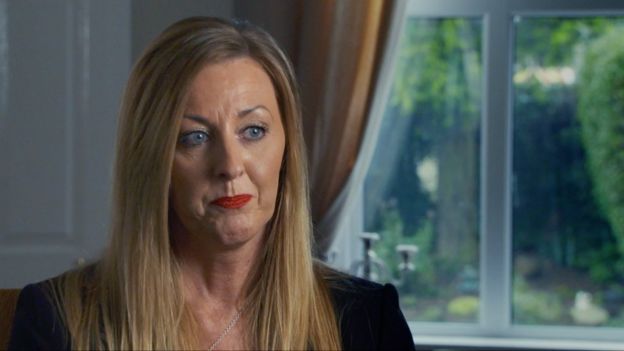News
Tunisia beach attack: ‘Mastermind’ named
A BBC investigation has identified the man accused of organising the terror attack on a beach that killed 38 people in Tunisia.
Chamseddine al-Sandi is described as the “mastermind” behind the attack in documents obtained by Panorama.
He is named in confessions from suspects who were arrested in connection with the shootings.
Seifeddine Rezgui opened fire on the beach and in the Imperial Hotel near Sousse in June 2015.
Rezgui was killed at the scene, but the documents obtained by Panorama say that he was recruited and directed by al-Sandi.
The confessions say al-Sandi ran a militant cell responsible for both the Sousse shootings and the attack three months earlier at the Bardo National Museum in which 22 people died. Both attacks were claimed by the so-called Islamic State.


The documents show how closely Rezgui worked with the Bardo gang – describing how he met with them in cafes and mosques in Tunis and how he trained alongside one of the Bardo gunmen in an IS camp in Libya.
According to the confessions, al-Sandi recruited the attackers, paid for them to go to Libya for training and gave them their orders.
Al-Sandi is now believed to be on the run in Libya. The Tunisian authorities have issued warrants for his arrest in connection with both the Bardo and Sousse attacks, but the documents obtained by Panorama reveal the extent of his alleged involvement for the first time.


Of the 38 people who were killed in Sousse in June 2015, 30 were British, three were from Ireland, two were German, one was from Russia, one was Belgian and one was from Portugal.
The inquests into the deaths of the British tourists starts next week. But the lawyer representing many of the families told Panorama that he was unaware of al-Sandi’s involvement and had not seen his picture before.
“I have not seen that,” said Demetrius Danas. “If you are right, and the families see that, they will be shocked to see the face of the man who caused them so much sadness.”
Some of the families who were caught up in the Sousse attack have told Panorama that they were assured by tour operator Thomson that it was safe to travel to Tunisia.
Nicki Duffield said she rang Thomson repeatedly to check on the security situation after hearing about the Bardo museum attack.
“I was just constantly asking: ‘Are we going to be safe, can you guarantee we are going to be safe?'” she said. “We were definitely told that there would be increased security.”


Alison Caine also called Thomson because she was worried about going to Tunisia.
She said: “We called them after Bardo to make sure that it was still safe to travel and they reassured us it was and security had been stepped up. But I just wanted to make sure again the following month so we called them again just to double-check.”
Ms Caine said she felt reassured by Thomson: “Everything was fine, it was safe to travel. They were not doing any refunds or transfers.”
The families say they were told by the tour operator that if they cancelled they wouldn’t get their money back.
TUI, the travel company that owns Thomson, said it wants to understand the specific circumstances that led to the killings.
“We are cooperating fully with the Coroner and will continue to do so, in order to help ensure that the tragic deaths of those killed can be thoroughly investigated, the relevant facts determined and any lessons learned.”
The company said it would be inappropriate to comment further before the inquests but it doesn’t accept the accuracy of all the statements that have been made.
News
Oseni Supports Ibadan Mosque Project with N20m
The lawmaker representing Ibarapa East/Ido Federal Constituency of Oyo State, Engr. Aderemi Oseni, has donated the sum of N20 million to support the construction of the new Lalupon Central Mosque project.
Contained in a statement on Sunday by his media aide, Idowu Ayodele, the generous donation, aimed at promoting religious harmony and community development, was made during the turbaning ceremony and launching of a N150 million endowment fund for the mosque’s completion. The event took place at Lalupon Central Primary School, Ibadan, and was graced by religious leaders, community members, and dignitaries.
Speaking at the event, Oseni, who also chairs the House Committee on Federal Roads Maintenance Agency (FERMA), emphasised the importance of supporting initiatives that foster unity and strengthen faith within communities.
“This is more than just a building; it is a symbol of faith, togetherness, and hope for future generations,” the lawmaker stated. “It is my honour and duty to contribute to a project that holds such profound significance for the people of Lalupon,” he added.
Leaders of the Lalupon Muslim Community commended the lawmaker for his generosity, describing the gesture as a testament to his dedication to the welfare of his people.
They noted that his contribution would significantly accelerate the progress of the mosque project.
The new Lalupon Central Mosque, once completed, is expected to serve as a hub for spiritual activities and a unifying space for the Muslim community in the area.
News
Rep Oseni Urges Unity, Compassion in Christmas Message to Nigerians
As Nigerians celebrate Christmas amidst festivities and reflections, the Chairman of the House Committee on Federal Roads Maintenance Agency (FERMA) and lawmaker representing Ibarapa East/Ido Federal Constituency of Oyo state, Engr. Aderemi Oseni has sent a heartfelt message to Nigerians, emphasising the importance of unity, compassion, and selflessness in nation-building.
In his Christmas message on Wednesday, contained in a statement by his media aide, Idowu Ayodele, and made available to journalists in Ibadan, the lawmaker described the season as a time to reflect on the love and sacrifice demonstrated by the birth of Jesus Christ.
He urged citizens to embrace the spirit of giving, kindness, and shared humanity that Christmas symbolises.
“Christmas is a season of hope, joy, and renewal,” Oseni said. “It reminds us of our shared duty to show love to one another, regardless of ethnicity, religion, or political affiliations. Let us work together to foster unity and peace in our country, especially as we navigate through challenging times.”
The lawmaker also highlighted the significance of collective responsibility in nation-building.
“As we celebrate, we must remember the less privileged in our communities. Acts of charity and kindness, no matter how small, can make a significant impact on someone’s life,” he added.
The APC chieftain expressed gratitude to his constituents in Ibarapa East/Ido for their unwavering support, assuring them of his commitment to delivering more impactful governance.
He also called for patience and cooperation as the government works towards addressing issues affecting the nation, including infrastructure development, economic stability, and security.
“Let this Christmas inspire us to continue building bridges of hope and fostering the true Nigerian spirit of togetherness,” he stated.
As the year draws to a close, Oseni encouraged Nigerians to remain optimistic about the nation’s future, assuring them that better days lie ahead with collective effort and unwavering faith.
News
NCAA Sanctions Five Airlines Over Regulatory Breaches
The Nigeria Civil Aviation Authority (NCAA) has initiated enforcement action against five airlines—two international and three domestic operators—for various violations of its regulations under Part 19.
The offenses include non-payment of passenger refunds within the stipulated timeframe, non-responsiveness to NCAA directives, mishandling of luggage, short-landed baggage, delayed and canceled flights, among other infractions.
Addressing journalists at the NCAA’s corporate headquarters in Abuja on Tuesday, Michael Achimugu, the Authority’s spokesman, stated that airlines must adhere to regulations regarding flight disruptions. He emphasized that failure to comply attracts sanctions.
“Although airlines are not always responsible for flight disruptions, NCAA regulations stipulate actions that airlines must take during such incidents. Failure to comply attracts various levels of sanctions,” Achimugu said.
He reminded airlines of the NCAA’s recent directive mandating refunds to passengers within 14 days for online ticket purchases and immediate cash refunds for tickets bought with cash.
The yuletide season has seen a rise in passenger complaints about delays and cancellations, largely attributed to harmattan-induced poor visibility. Achimugu clarified that airlines are not liable for cancellations due to force majeure but stressed that the enforcement actions are for cases where airlines are found at fault.
“This is harmattan season, so there is poor visibility. Flights must get canceled. This is force majeure, and the airlines do not owe passengers anything in those instances. The enforcement we are initiating today is on cases where the airline is deemed to have been at fault. More will come,” he explained.
Achimugu further disclosed that the NCAA would summon the chief executives of all airlines this week to address flight disruptions and regulatory breaches.
While the names of the sanctioned airlines were not officially revealed, sources close to the Authority identified them as Ethiopian Airways, Royal Maroc Airways, Arik Air, Aero Contractors, and Air Peace.
-



 News3 days ago
News3 days agoOseni Supports Ibadan Mosque Project with N20m
-



 Entertainment1 week ago
Entertainment1 week agoFunke Akindele Breaks Records Again! ‘Everybody Loves Jenifa’ Hits N500M in Just 12 Days
-



 News1 week ago
News1 week agoFuel Price Relief: PETROAN Promises Pump Price Drop This Week
-



 News1 week ago
News1 week agoFG Declares Festive Public Holidays